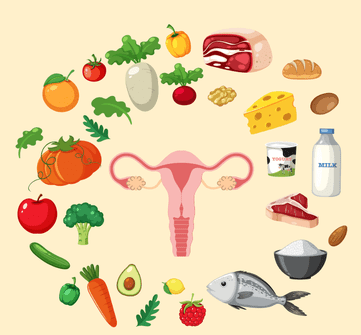Menstrual health is increasingly recognised as a marker of overall health. In Aotearoa awareness is growing, — with more kōrero around period equity in schools, access to free period products, and the role of nutrition in supporting wāhine through their cycles.
A healthy cycle gives insight into hormonal balance, metabolic health, and nutritional status. Yet many women here still accept fatigue, cramps, mood changes, or irregular bleeding as “normal.” While common, these symptoms are often linked to underlying nutritional gaps or imbalances that can be improved with diet and lifestyle support.
Nutrition and the Menstrual Cycle
Hormones that regulate the cycle — primarily estrogen and progesterone — are made from cholesterol and require vitamins and minerals to function optimally. Evidence shows that certain nutrients consistently support menstrual health.
Iron
Blood loss during menstruation can increase the risk of iron deficiency. New Zealand women, particularly teenagers and young adults, are among those at higher risk. A study of adolescent women in NZ found iron deficiency rates of around 11% in non-vegetarian adolescents (Skeaff et al., 2023). Further, local health data highlight that menstruating people are one of the highest-risk groups for low iron in Aotearoa (Healthify, 2025). An Auckland study also found that more than half (55.8%) of pre-menopausal women had iron insufficiency (Lim et al., 2020). Good food sources include lean red meat (beef, lamb, venison), poultry, fish (snapper, hoki), lentils, beans, pumpkin seeds, and leafy greens like spinach. Pairing plant-based iron with vitamin C from kiwifruit, feijoas, or capsicum boosts absorption.
Magnesium
Research shows magnesium can help with PMS-related mood changes and menstrual cramps due to its role in muscle relaxation and neurotransmitter regulation. Local sources include nuts (especially almonds and cashews), seeds, whole grains, legumes, and dark chocolate.
Omega-3 fatty acids
Randomised controlled trials show omega-3s reduce menstrual pain intensity, often with effects comparable to anti-inflammatory medications. Great sources include oily fish such as salmon, trevally, kahawai, sardines, as well as flaxseed, chia, and walnuts.
B vitamins
B6 supports mood during PMS, while folate (B9) and B12 are essential for red blood cell production and energy. Sources include whole grains, legumes, leafy greens, eggs, meat, and dairy. Fortified breads (mandated in NZ with folic acid) are another source of folate.
Fibre
Fibre helps the body eliminate excess hormones and is linked to more regular cycles. However, average intake is low: NZ European women consume about 21–24 g/day, and Pacific women closer to 18–19 g/day (Thornley et al., 2024). This is below the recommended intake of ~25 g/day. Other reports suggest that average fibre intake for NZ adults is closer to 20 g/day, again short of optimal levels (Sanitarium, n.d.).
Local Dietary Patterns & “Gaps” in NZ
These NZ statistics show how many women may not be meeting recommendations for nutrition that supports menstrual health:
Fruit & vegetable intake: Only 38.4% of women meet the combined vegetable + fruit recommendation (Ministry of Health, 2022).
Fibre intake: Many women consume less than the recommended daily fibre, averaging 18–24 g/day depending on ethnicity and body fat levels (Thornley et al., 2024).
Iron deficiency in adolescents: Around 11% of NZ adolescent girls are iron deficient (Skeaff et al., 2023).
Tailoring Nutrition to Your Cycle
Your body’s needs shift across the menstrual cycle, and tailoring nutrition can improve comfort and energy:
Menstrual phase (days 1–5): focus on iron-rich foods (red meat, beans, spinach) and hydration. Warm meals like soups or slow-cooked stews may ease cramps.
Follicular phase (days 6–13): with rising energy, emphasise fresh, nutrient-dense kai — lean proteins, whole grains, and colourful seasonal vegetables.
Ovulation (days 14–16): antioxidant needs rise — load up on berries, kiwifruit, leafy greens, and bright veg, alongside adequate protein.
Luteal phase (days 17–28): stabilise blood sugar by pairing carbohydrates (kūmara, oats, brown rice) with protein and healthy fats. Magnesium-rich foods (nuts, seeds, legumes) can help reduce bloating and irritability.
Lifestyle strategies that support cycle health
It’s not just food that matters. Other evidence-backed approaches include:
Caffeine moderation: high coffee or energy drink intake can increase PMS severity.
Hydration: supports digestion and hormone clearance.
Movement: regular moderate activity reduces PMS symptoms and improves mood. Movement like walking, cycling, or yoga can be built into everyday NZ life.
What to avoid
Even well-intentioned habits can worsen symptoms:
Skipping meals → destabilises blood sugar, increasing irritability, fatigue, and cravings.
Low protein diets → limit hormone production and repair.
Ultra-processed foods, refined sugars, and trans fats → linked to more severe PMS and cycle irregularities.
Taking small steps
You don’t need to overhaul your diet overnight. Small, consistent changes like adding an extra serving of leafy greens, swapping white bread for wholegrain, or including oily fish twice a week, can make a big difference.
Every woman’s cycle is unique. Stress, contraceptive history, nutrient status, and underlying health all shape your needs. That’s why personalised support is often the most effective way forward.
Next steps
If you’ve been struggling with heavy, irregular, painful, or unpredictable cycles, nutrition can make a meaningful difference. The most powerful changes happen when your nutrition is tailored to your body, your symptoms, and your lifestyle.
That’s exactly what I help women do.
